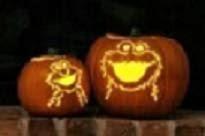- Trick-or-treating?
- Fright?
- A "spooked" feeling?
In modern America it sounds like this is what the celebration of Halloween is all about.
Where did the idea of "Halloween" originate and why is it recognized at all?
The term Halloween is actually a contraction of the words All Hallows' Eve. In this context the word "Hallow" means Saint. It is the day preceding All Saints Day in Western Catholicism. (There is more on that later in the post).
All Saints Day honors what the name implies, which is all saints. In Christianity many Saints who have died have days commemorated for them, such as Saint Peter or Saint Paul, etc. All Saints Day also includes the lesser known saints who died that most people have never heard of. The day before and All Saints Day together are commonly referred to as Hallowmas.
So far it doesn't sound like anything evil.
(However, a logical question the author might ask is why people don't dress up in their favorite Saint for All Saints Day.)
So, Where DID Halloween Come From?
Research shows it seems to have Pagan origins, like many other Christian holidays. For example Christmas is modeled after a Pagan holiday celebrating the Winter Solstice, or the shortest day of the year. (The "Light" of Jesus comes when it is the darkest).
In America the day of Halloween has turned secular and commercial without realizing its' roots. The current customs come mostly from old Pagan customs. Regarding why the pumpkin (or "Jack-o-lantern") was associated with Halloween please refer to Pumpkin History.
 From everystockphoto.com
From everystockphoto.comIn old Pagan societies there were holidays recognized for the start of the four seasons, but also for the middle of those four seasons. It resulted in eight annual Pagan holidays. The one now known as Halloween was a holiday in the middle of a season, which symbolically signified he end of summer. That was important for the harvest season. Pagans corresponded the start of a dark winter season with human death, which might be one place where the association with evil comes from. They also viewed human death as dark.
Some of the modern customs likely come from Pagans such as the ancient Druids, who were Celtic. Druids were the Priestly class of people in society.
Their belief was that it was a special time of the year, as winter was coming. According to their beliefs, during that time of the year the spirits who had not yet gone to heaven behaved a certain way. Spirits who died in the preceding year roamed the earth and were especially present on that night before Halloween. Apparently this corresponded to the beginning of winter.
Is Halloween Christian, Then?
The spirits were believed to be either "entertained by the living" or to "find a body to possess for the incoming year". This explains how by "dressing up like witches, ghosts and goblins, villagers could avoid being possessed." * Thus, Halloween has a correlation with death, but not in the way it appears in secular America.
In Christianity only the Western Catholics acknowledge Halloween. They acknowledge it is the day before All Saints Day. In that regard it is NOT associated with the Pagan holiday.
The Eastern Catholics (Orthodox) celebrate a day with the same idea in the Easter Season, but it is attributed to Saints and not Demons. The idea is to acknowledge ALL the Saints, and not just the Saints who have special days attributed to them. Thus it is called "All Saints Day." In the Bible, ALL believers are called to be Saints.
In terms of Christianity Halloween is only a holiday to the extent it recognizes Saints. It is not about demons.
Happy End Of Summer
Sources
* A Reminder Of Death, Michelle Navarro, Oct. 1997
You might also be interested in:
The Origins Of Halloween
The Pagan Roots Of Halloween
Author: Albert Wagner

